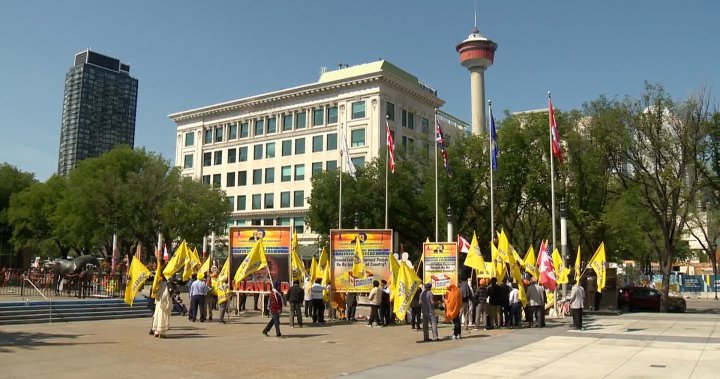The rain-soaked streets of downtown Calgary became the backdrop for a significant protest yesterday as nearly 300 members of the local Sikh community gathered to voice their opposition to Indian Prime Minister Narendra Modi’s presence at the G7 Summit. Having covered numerous demonstrations in our city over the years, I can say this one carried a particularly charged atmosphere, blending local activism with international politics in a way we don’t often see in Calgary.
Standing beneath umbrellas at the Harry Hays federal building, protesters held signs demanding “Justice for Genocide” and “Free Punjab” while chanting slogans opposing Modi’s policies. The demonstration underscored how global tensions can manifest right here in our neighborhoods, particularly in a city with such diverse communities as Calgary.
“This isn’t just about politics happening thousands of kilometers away,” explained Harjinder Singh, one of the protest organizers. “For many Calgary Sikhs, these are deeply personal issues affecting their families and ancestral homes. We want Canadians to understand why Modi’s presence at the G7 is problematic for so many of us.”
The Calgary Police Service maintained a visible but measured presence, with officers redirecting traffic around the demonstration. I spoke with Staff Sergeant Martin Thompson, who confirmed there had been no incidents requiring intervention. “Our role today is simply to ensure everyone’s safety and right to peaceful assembly,” he noted.
What struck me most while interviewing participants was the generational spread – grandparents who immigrated decades ago stood alongside Canadian-born grandchildren, all united in their concerns about religious freedom and human rights in India. Many specifically referenced the Khalistan movement, which advocates for an independent Sikh homeland in Punjab.
Dr. Anjali Patel, a political science professor at the University of Calgary who specializes in South Asian politics, explained the broader context when I reached out to her after the demonstration. “These tensions have deep historical roots dating back to India’s independence and partition. For Calgary’s Sikh community, which numbers around 45,000 people, these aren’t abstract issues but deeply felt connections to heritage and identity.”
The protest comes as Modi attends the G7 Summit in Quebec as a special guest, where he’ll meet with world leaders including Prime Minister Justin Trudeau. Relations between Canada and India have been particularly strained since last fall, when Trudeau suggested Indian government agents might be linked to the killing of Sikh leader Hardeep Singh Nijjar in British Columbia.
“We want the Canadian government to hold Modi accountable for human rights violations,” said Gurpreet Kaur, a second-generation Calgary resident who participated in the protest. “When Canada hosts someone accused of suppressing religious minorities, it feels like a betrayal to many of us who came here specifically for freedom and democracy.”
City Councillor Jasmine Dhillon, who represents a ward with a significant South Asian population, observed the demonstration briefly. While careful not to take a political position on the international dispute, she acknowledged the importance of community expression. “Calgary’s strength comes from allowing all voices to be heard respectfully,” she told me afterward.
The economic relationship between Alberta and India remains significant, with bilateral trade exceeding $350 million annually according to provincial figures. Several Calgary-based energy companies have established partnerships in India, creating a complex interplay between economic interests and human rights concerns.
For many Calgarians driving past the demonstration, the nuances of this conflict might seem distant from daily life in our city. But as our community becomes increasingly diverse – with nearly 30% of residents born outside Canada according to the latest census data – these global connections increasingly shape our local landscape.
The protest dispersed peacefully by late afternoon, though organizers indicated they plan additional demonstrations throughout Modi’s Canadian visit. Calgary Police confirmed they’re monitoring plans but don’t anticipate any security concerns.
As someone who’s chronicled our city’s evolution for nearly two decades, I’ve observed how Calgary’s international connections have deepened. Yesterday’s protest wasn’t just about faraway politics – it reflected the changing fabric of our city itself, where global citizenship and local identity increasingly intertwine.
While Calgary may be physically distant from Punjab, for many of our neighbors, that connection remains profoundly present in their daily lives. Understanding these perspectives enriches our collective community knowledge, regardless of where one stands on these complex international issues.







